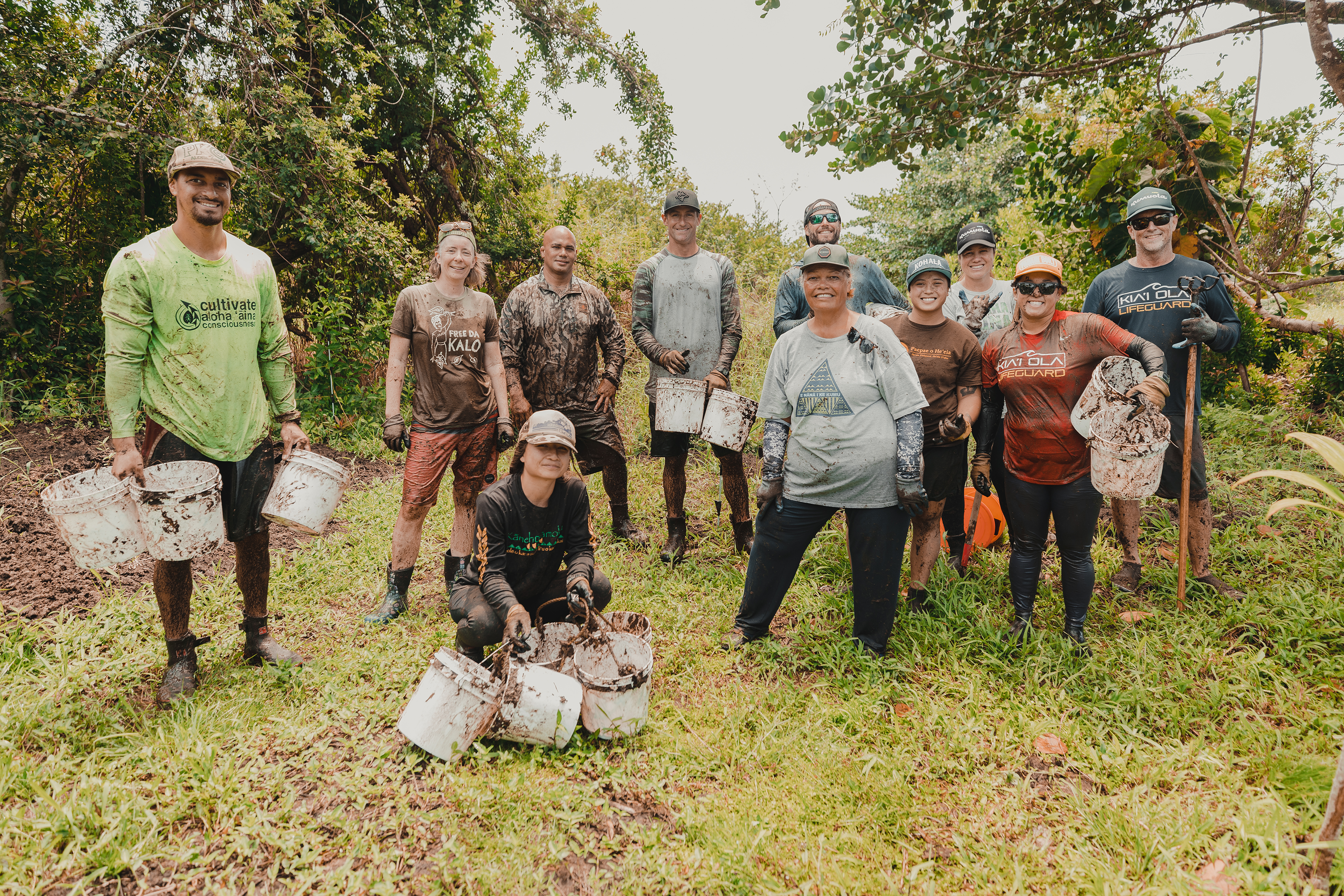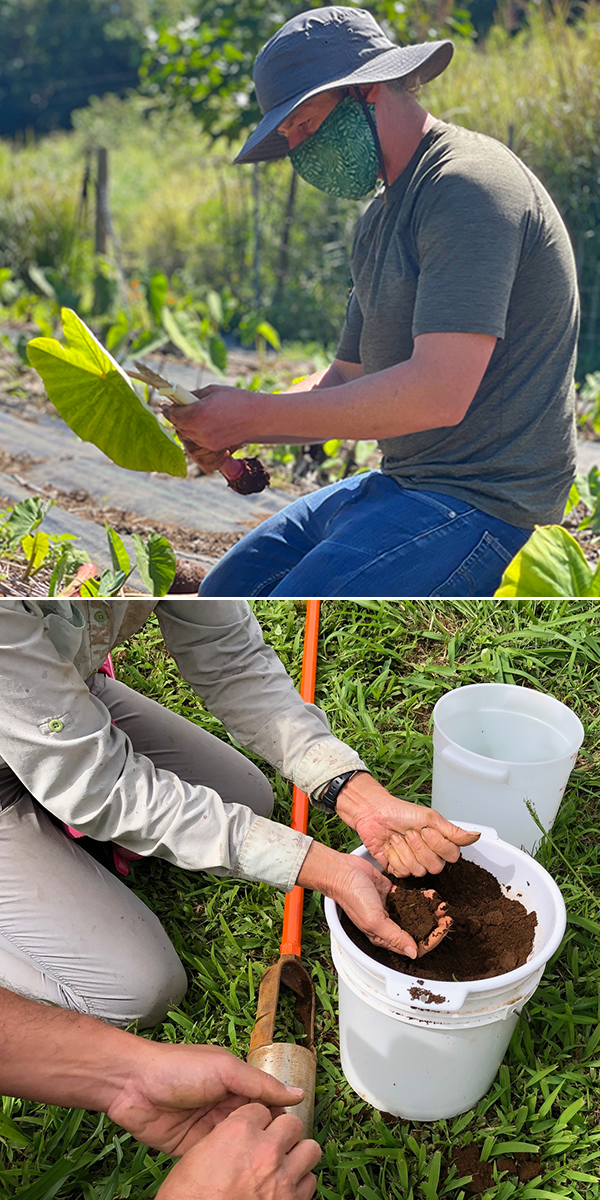The Kohala Center’s Ōhāhā Mahi ‘Ai program reconnects local farmers and gardeners with ancestral relationships to food and deepens kinship with ‘āina through ‘ike rooted in traditional Hawaiian knowledge and practices while also incorporating regenerative western approaches.
Our program includes six in-person sessions* at Nāmoku, our demonstration farm in Honoka‘a, on consecutive Saturdays, six online sessions on consecutive Wednesdays, and two huaka‘i (learning journeys) to traditional agricultural sites in Kohala and Hāmākua.
- Engage with ‘āina through hana, ‘ike kūpuna, and appropriate cultural protocols
- Learn about kilo (environmental observation), kaulana mahina (Hawaiian moon calendar), lā‘au lapa‘au (medicinal plants), seed saving and production, plant nutrition, traditional planting methods, and soil health
- Deepen understanding of fulfilling kuleana to ‘āina, ‘ohana, and lāhui
Participants will also receive individual coaching from our rural and cooperative business development specialists.
*Appropriate safety protocols to mitigate transmission of the coronavirus will be in effect and required of all participants.
Program Schedule
(Sample schedule, subject to change)
Please note: Attendance at in-person sessions is required to attend the online sessions. There is no option to register for online sessions only.
On-farm sessions in Honoka‘a
Saturdays, 9 a.m.–2 p.m.
Total 15 hours presentations + 15 hours hana
- Session 1: Mālama Hāloa: Kalo variety ID and traditional planting methods
- Session 2: ‘Awa: Planting methods, variety ID, and basic ceremonial protocol
- Session 3: Engagement with ʻāina through hana guided by ʻike kūpuna, kaulana mahina, kilo, weather prediction
- Session 4: Soil health: The base of sustainable agriculture and agroecosystems function
- Session 5: Lāʻau Lapaʻau: The seven laws of healing, plant ID and application, and gathering protocols
- Session 6: Seed production and saving: Developing locally adapted specialty crops
Virtual sessions on Zoom
Mid-week, 5–6:30 p.m.
Total 9 hours
- Session 1: Mana‘o of mahi‘ai and moʻolelo pōkole
- Session 2: Kānaka ‘Ōiwi agriculture: Past and present
- Session 3:
Community agricultural initiatives - Session 4: Trends in Hawai‘i agriculture and microloans
- Session 5: Restoring ʻāina through ʻike kūpuna
- Session 6: Traditional gathering and cooking methods
Huaka‘i
Saturdays, 9 a.m.–3 p.m.
Total 12 hours
- Huaka‘i 1: Ulu Mau Puanui (Kohala Mountain)
- Huaka‘i 2: Waipi‘o Valley
Application and Fees
Applications will be available as soon as dates of next session are determined.
There is no cost to enroll, but space is limited.
Contact Ka‘iana Runnels at krunnels@kohalacenter.org or 808-887-6411 for more inormation and to be notified about future program sessions.
Other Farmer Training Programs on Hawai‘i Island
GoFarm Hawai‘i
The University of Hawai‘i GoFarm Hawai‘i program is designed to increase the number of local agricultural producers by offering those with an interest in agriculture a combination of knowledge, experience, and support to assist them in becoming viable production growers, and accomplish this in a manner that encourages sustainability. GoFarm Hawai‘i focuses on providing practical experience and knowledge for those seeking to farm commercially. Participants will practice growing their own crops on program land.
https://gofarmhawaii.org/gofarm-training-program
https://gofarmhawaii.org/calendar/hawaii-island
Hawaii Institute of Pacific Agriculture
The Hawaii Institute of Pacific Agriculture (HIP Agriculture) is a conscious movement of inspired individuals living a model of sustainability through direct engagement with the earth and service to youth and communities. Located in North Kohala, HIP Agriculture is a growing community that cultivates a diverse collection of Polynesian crops and operates as an educational site offering sustainable agriculture courses, youth programming, community workshops and events. Through farming and hands-on education HIP Agriculture is pioneering a new paradigm of conscious agriculture that honors indigenous wisdom, food sovereignty, and the transformational power of returning to the land.
https://hipagriculture.org



